Daily Vocabulary Words: List of Daily Used Words in Leading Indian Newspapers
Hi there. Welcome to this special section @ Wordpandit. Our endeavour here is straightforward: highlighting daily vocabulary words that you would come across in leading newspapers in the country. We have included the following newspapers in our selection:
• The Times of India
• The Economic Times
• Hindustan Times
• Mint
• Indian Express
We are putting in extensive work to develop your vocabulary. All you have to do is be regular with this section and check out this post daily. This is your repository of commonly used words; essentially, we are posting a list of daily used words. Hence, this has significant practical application as it teaches you words that are commonly used in leading publications mentioned above.
Visit the website daily to learn words from leading Indian newspapers.
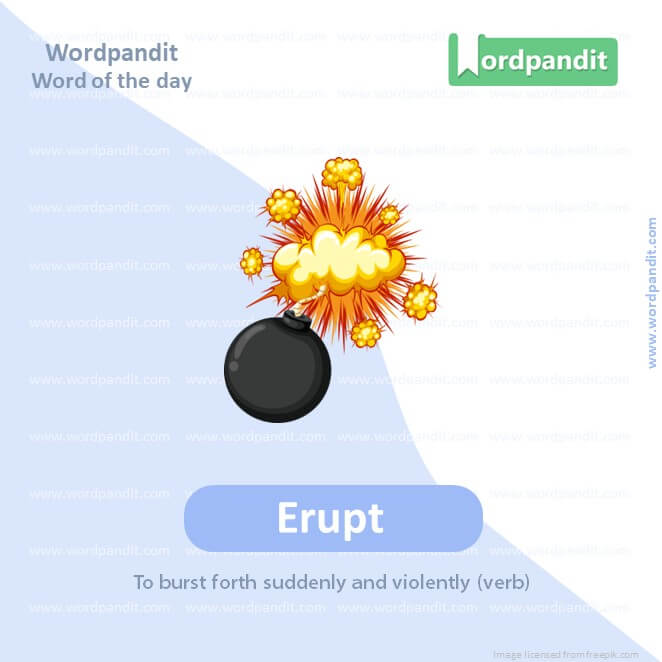
WORD-1: Erupt
CONTEXT: Truckers’ ‘steering chhodo andolan’ – parking their trucks to clog highways and choke supply – did not suddenly erupt flash-mob style. It followed a letter written end-December to GOI by All India Motor Transport Congress (AIMTC) requesting a review of the maximum 10-year jail term and ₹7 lakh fine for hit-and-run accidents in India’s new penal code BNS.
SOURCE: Times of India
EXPLANATORY PARAGRAPH: Think of a volcano that suddenly starts throwing out lava and ash. That’s what ‘erupt’ means – it’s when something bursts out suddenly and powerfully, like a volcano or even a person suddenly getting very angry.
MEANING: To burst forth suddenly and violently (verb).
PRONUNCIATION: ih-rupt
SYNONYMS: Explode, Burst, Blow up, Spout, Belch.
USAGE EXAMPLES:
1. The volcano erupted with a loud noise.
2. He erupted in anger over the unfair decision.
3. Laughter erupted from the crowd.
4. The protests erupted into chaos.
WORD-2: Deterrent
CONTEXT: The association believes the 10-year jail term will act as a deterrent to men joining the gruelling transportation sector, which already suffers a 27% shortage of drivers. The lifeline of India’s supply chain stood disrupted.
SOURCE: Times of India
EXPLANATORY PARAGRAPH: Imagine a big ‘Keep Out’ sign that makes you not want to go into a scary house. A ‘deterrent’ is something that stops you from doing something because you think it might be bad or lead to trouble.
MEANING: Something that discourages or is intended to discourage someone from doing something (noun).
PRONUNCIATION: deh-tur-rent
SYNONYMS: Hindrance, Obstacle, Preventive, Discouragement, Check.
USAGE EXAMPLES:
1. The alarm system serves as a deterrent to burglars.
2. High prices act as a deterrent to buyers.
3. The threat of punishment is a deterrent to crime.
4. They installed cameras as a deterrent.
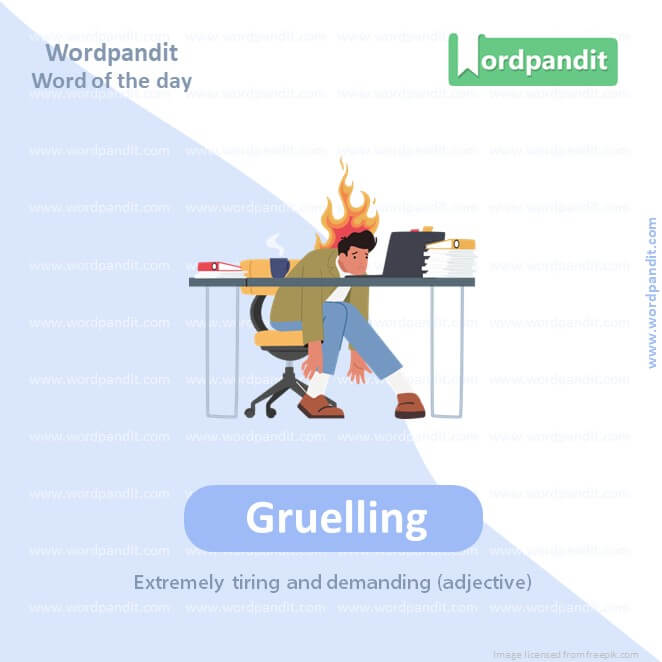
WORD-3: Gruelling
CONTEXT: The association believes the 10-year jail term will act as a deterrent to men joining the gruelling transportation sector, which already suffers a 27% shortage of drivers. The lifeline of India’s supply chain stood disrupted.
SOURCE: Times of India
EXPLANATORY PARAGRAPH: Imagine having to clean up your entire house all by yourself; it’s really hard and makes you very tired. That’s what ‘gruelling’ means – something that is very difficult and exhausting.
MEANING: Extremely tiring and demanding (adjective).
PRONUNCIATION: groo-uh-ling
SYNONYMS: Exhausting, Tough, Strenuous, Arduous, Taxing.
USAGE EXAMPLES:
1. She finished the gruelling marathon.
2. The workers faced a gruelling schedule.
3. It was a gruelling journey through the mountains.
4. They underwent gruelling training.
WORD-4: Disrupted
CONTEXT: The association believes the 10-year jail term will act as a deterrent to men joining the gruelling transportation sector, which already suffers a 27% shortage of drivers. The lifeline of India’s supply chain stood disrupted.
SOURCE: Times of India
EXPLANATORY PARAGRAPH: Imagine you’re building a tower of blocks and someone knocks it over. Your building was ‘disrupted,’ which means something was interrupted or messed up while it was happening.
MEANING: To interrupt by causing a disturbance or problem (verb).
PRONUNCIATION: dis-ruhpt
SYNONYMS: Interrupt, Disturb, Interfere, Upset, Hamper.
USAGE EXAMPLES:
1. The storm disrupted power supplies.
2. Traffic was disrupted by the parade.
3. Her studies were disrupted by illness.
4. The protest disrupted the meeting.
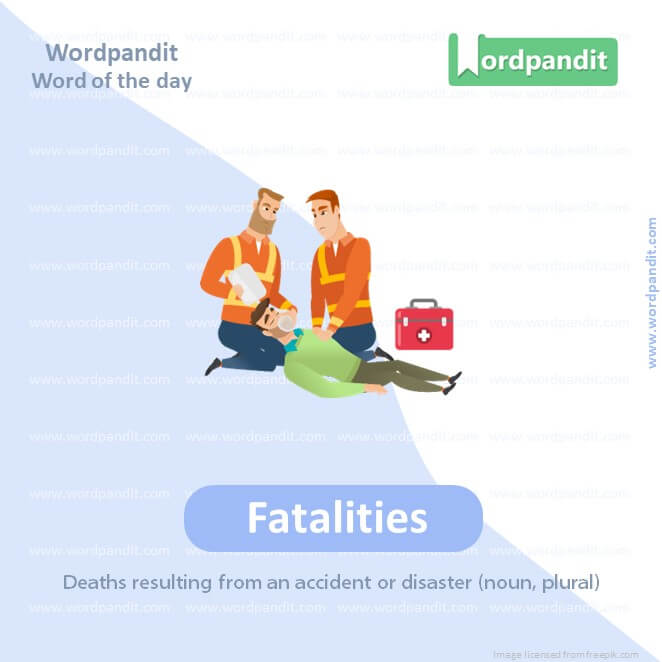
WORD-5: Fatalities
CONTEXT: In 2022, almost 59,000 people died in hit-and-run cases, about 30% of all road fatalities.A person died in a highway accident every hour in Maharashtra in 2022, up 14% from the previous year. Indians can be callous drivers, with little care for rules or regulations.
SOURCE: Times of India
EXPLANATORY PARAGRAPH: ‘Fatalities’ is a sad word. It means people who have died, usually because of an accident or disaster. It’s a way to talk about deaths in serious situations.
MEANING: Deaths resulting from an accident or disaster (noun, plural).
PRONUNCIATION: fuh-tal-i-tees
SYNONYMS: Deaths, Casualties, Loss of life, Mortalities, Demises.
USAGE EXAMPLES:
1. The car crash resulted in several fatalities.
2. The earthquake caused many fatalities.
3. They reported the number of fatalities from the disease.
4. Efforts are made to reduce road fatalities.
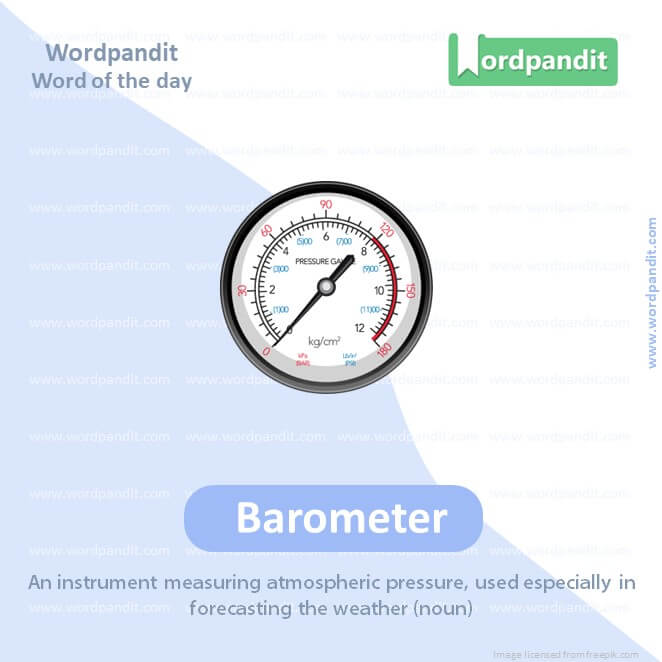
WORD-6: Barometer
CONTEXT: For India, which aims to rise on the global tourism charts, they are a handy barometer of how good it’s got at playing host. Unfortunately, the country’s capital performed particularly poorly.
SOURCE: Times of India
EXPLANATORY PARAGRAPH: A ‘barometer’ is a tool used to tell what the weather might be like. It measures the air pressure and can help predict if it will be sunny, rainy, or stormy.
MEANING: An instrument measuring atmospheric pressure, used especially in forecasting the weather (noun).
PRONUNCIATION: buh-rom-i-ter
SYNONYMS: Weather gauge, Pressure gauge, Indicator, Measure, Gauge.
USAGE EXAMPLES:
1. The barometer shows a drop in air pressure.
2. He used a barometer to predict the weather.
3. The stock market is often a barometer of economic health.
4. Her mood is a good barometer of the team’s morale.
WORD-7: Jiggering
CONTEXT: From deploying too few traffic police to being sleepy about advance traffic jiggering, it was like the authorities didn’t see the crowds coming.
SOURCE: Times of India
EXPLANATORY PARAGRAPH: ‘Jiggering’ is a word that might sound funny! It’s used to talk about adjusting something very carefully or making small changes to get it just right.
MEANING: To adjust or alter slightly (verb).
PRONUNCIATION: jig-uh-ring
SYNONYMS: Adjusting, Tweaking, Modifying, Altering, Fine-tuning.
USAGE EXAMPLES:
1. He was jiggering the device to make it work.
2. She spent hours jiggering the engine.
3. They kept jiggering the plan until it was perfect.
4. Jiggering the settings improved the machine’s performance.
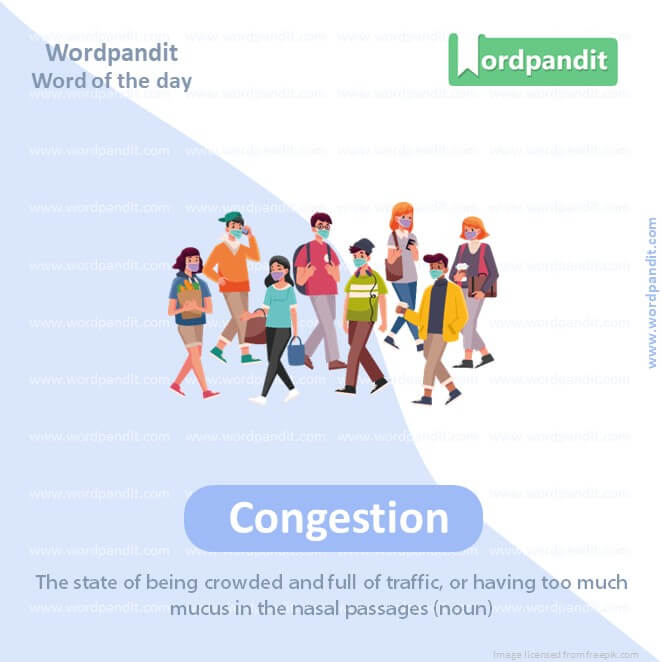
WORD-8: Congestion
CONTEXT: A better run city would have increased the Metro frequency suitably, enforced special pedestrian and parking zones, and put out constant congestion alerts on social media.
SOURCE: Times of India
EXPLANATORY PARAGRAPH: Imagine a road with so many cars that they can barely move. That’s ‘congestion’ – when a place is overly crowded or full, making movement slow and difficult.
MEANING: The state of being crowded and full of traffic, or having too much mucus in the nasal passages (noun).
PRONUNCIATION: kun-jes-chun
SYNONYMS: Traffic jam, Blockage, Overcrowding, Clogging, Jam.
USAGE EXAMPLES:
1. Traffic congestion is a big problem in the city.
2. The cold caused nasal congestion.
3. Congestion on the roads increases during holidays.
4. They’re looking for solutions to reduce congestion.
WORD-9: Revelry
CONTEXT: Maharashtra’s and Bengal’s capitals saw a lot of extra police bandobast. Kolkata saw a lot of effort going into keeping the revelry flowing painlessly on Park Street. Pedestrian and car traffic was unusually well segregated.
SOURCE: Times of India
EXPLANATORY PARAGRAPH: Think of a fun party with music, dancing, and laughing. That’s what ‘revelry’ is – enjoying yourself in a lively and noisy way, often with lots of people.
MEANING: Lively and noisy festivities, especially when these involve drinking and dancing (noun).
PRONUNCIATION: rev-uhl-ree
SYNONYMS: Merrymaking, Festivity, Celebration, Party, Carousing.
USAGE EXAMPLES:
1. The streets were filled with revelry on New Year’s Eve.
2. They joined in the revelry at the festival.
3. The wedding was a night of joyous revelry.
4. The sound of revelry came from the neighbor’s house.
WORD-10: Bailiwick
CONTEXT: Foreign investors, so-called smart money, got serious FOMO – a condition so far alleged to be “uninformed” retail’s bailiwick – when Indian markets held up remarkably well in 2022 despite serious levels of foreign outflows.
SOURCE: Times of India
EXPLANATORY PARAGRAPH: ‘Bailiwick’ is a fancy word that means an area or subject that someone knows a lot about. It’s like being really good at a game or knowing everything about dinosaurs.
MEANING: One’s sphere of operations or particular area of interest (noun).
PRONUNCIATION: bay-li-wik
SYNONYMS: Domain, Territory, Field, Area of expertise, Specialty.
USAGE EXAMPLES:
1. Astronomy is his bailiwick.
2. Cooking is not really my bailiwick.
3. She confidently handled all matters in her bailiwick.
4. They were discussing topics outside my bailiwick.
Vocabulary Daily Use Words
In the architecturally diverse world of language learning, ‘vocabulary daily use words’ act as a cornerstone. We often take these words for granted, but their significance in day-to-day communications is nothing short of monumental. Mastering these ‘vocabulary daily use words’ should be more than an ancillary task on the sideline; it should take the center stage in your language learning journey.
To begin with, approach ‘vocabulary daily use words’ with the same gusto and reverence as you would an untapped treasure chest. Go beyond the conventional realm of textbooks and explore the world of contemporary literature, newspapers, and digital content. By immersing yourself in these mediums, you’re aligning your learning with real-world language usage, thereby gaining a practical understanding of ‘vocabulary daily use words.’
Memory-enhancing tools add an extra layer of effectiveness to your learning. Flashcards, for example, are a great way to make your study sessions interactive and memory-forging. Coupled with the Leitner system, which is a principle of spacing and repetition, you can ensure better recall and understanding of ‘vocabulary daily use words.’
Furthermore, leveraging mnemonic devices aids in etching the ‘vocabulary daily use words’ into your memory. Associating common words with unique and memorable narratives in your mind enhances their recall. Regular revision and using these words in routine conversations further cement your proficiency.
The potency of immersion as a language learning strategy cannot be emphasized enough. Conversing with native speakers, if possible, provides context to ‘vocabulary daily use words’ and boosts your fluency.
In conclusion, mastering the ‘vocabulary daily use words’ is an enriching journey that requires ongoing effort, continual exposure, and hands-on practice. The strategy of learning through various mediums, using memory-enhancing techniques, leveraging mnemonic devices, and immersion can help demystify these words and enhance your overall language proficiency. So, gear up and embrace the linguistic adventure of mastering the ‘vocabulary daily use words.’













